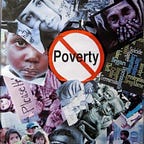Are Women More Vulnerable to Poverty?
“Poverty is a gendered experience,” says UNICEF Deputy Executive Director Geeta Rao Gupta. More women than men are poor. They are often the poorest of the poor. Women may be more vulnerable and less able to emerge from poverty because of their social status in some cultures. Helping women out of poverty requires taking a hard look at cultural values and the dynamics of power between men and women.
In many countries social norms dictate that a woman’s place is in the home, caring for the family. Men provide for the family by working outside the home. Such norms influence laws, policies and access to education, employment and property ownership in many societies. Girls and women have less access than men to education, employment and other resources that bring economic stability and advancement. This is especially true in poor households.
Girls and women do most of the work in poor households to care and feed their family members and other essential tasks. They may gather firewood, water and fodder for animals, care for livestock and tend to crops. This time-consuming, unpaid labor limits poor women’s ability to learn skills and earn outside incomes. Older girls, expected to care for younger children and help their mothers with household chores, are unlikely to go to school, which perpetuates the cycle of women’s disadvantage and poverty.
Maternal death also continues to be a major problem.
Globally, 303,000 women died from pregnancy-related causes in 2015. Nearly two-thirds of those deaths occurred in sub-Saharan Africa, the report’s authors say. Low-income women are particularly vulnerable. This is a challenge in the United States, too, the only developed country where the rate of maternal deaths is growing.
Women are vulnerable in other ways, too. According to the United Nations, 1 in 5 women and girls ages 15 to 49 reported experiencing physical or sexual violence at the hands of an intimate partner in the past 12 months.
Women’s paid and unpaid work is crucial for the survival of poor households. Yet women own only 15 percent of the land worldwide, work longer hours than men and earn lower wages. Studies show that income earned by women is more likely to be spent on children’s education and well-being, while men spend more of their income on personal needs. Women need equal access to opportunities. Investing in women as economic agents with power to control resources is an effective strategy to reduce poverty for all.
Gender inequality in the economy costs women in developing countries $9 trillion a year — a sum which would not only give new spending power to women and benefit their families and communities, but would also provide a massive boost to the economy as a whole.
Countries with higher levels of gender equality tend to have higher income levels, and evidence from a number of regions and countries shows closing the gap leads to a reduction in poverty.
In Latin America for instance, an increase in the number of women in paid work between 2000 and 2010 accounted for around 30 percent of the overall reduction in poverty and income inequality.
Supporting women to have access to quality and decent work and improve their livelihoods is therefore vital for fulfilling women’s rights, reducing poverty and attaining broader development goals.
Women’s economic empowerment is a key part of achieving this. We need a human economy that works for women and men alike, and for everyone, not just a fortunate few.
Resources
ShareAmerica. (2015, March 11). Why do more women than men live in poverty? | ShareAmerica. ShareAmerica. https://share.america.gov/why-do-more-women-than-men-live-poverty/#:~:text=More%20women%20than%20men%20are,power%20between%20men%20and%20women.
Why the majority of the world’s poor are women | Oxfam International. (2020, January 20). Why the majority of the world’s poor are women | Oxfam International. Oxfam International. https://www.oxfam.org/en/why-majority-worlds-poor-are-women
Erickson, A. (2018, February 14). Women poorer and hungrier than men across the world, U.N. report says. Washington Post; The Washington Post. https://www.washingtonpost.com/news/worldviews/wp/2018/02/14/women-poorer-and-hungrier-than-men-across-the-world-u-n-report-says/
